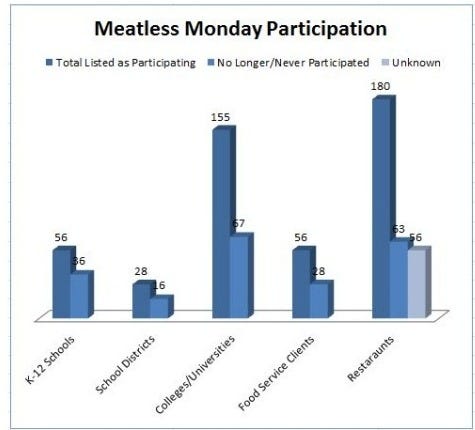Uncovering Myths about the Meatless Monday Campaign
October 17, 2013

For all its publicity, the fact is the Meatless Monday Campaign is grossly misrepresenting the campaign’s enrollment and prevalence among schools, restaurants, hospitals and colleges, according to an investigation by the Animal Agriculture Alliance.
In anticipation of the Meatless Monday campaign’s 10th anniversary, the alliance analyzed the overall effects of the campaign and gauged its effectiveness by individually surveying every participant listed on the Meatless Monday website. The alliance found that the campaign has not been as popular as the Meatless Monday movement claimed. Most notably:
Out of the 56 kindergarten through 12th grade schools listed as participating, more than 64.2% no longer or never participated in the program;
Out of the 155 colleges/universities listed as participating, more than 43.2% no longer or never participated in the program;
Out of the school districts listed as participating, more than 57% no longer do.

The Meatless Monday campaign also counts restaurants and foodservice providers among their allies, yet over 35% and 47%, respectively, no longer participate in the program.
“These results are truly astounding. When we started the project, we didn’t expect nearly as many organizations to not actually be participating in the program,” says Alliance President and CEO Kay Johnson Smith. “The Meatless Monday campaign tries to promote a reduction in meat, milk and egg consumption as trendy, but clearly it hasn’t taken off as strongly as they’d hoped.”
Schools, restaurants and foodservice providers also echoed these sentiments noting that adoption of the campaign was widely unpopular, led to food waste, and elicited complaints from parents worried about proper nutrition.
Near the alliance headquarters in Henrico County, VA, Jamie Jerabeck, a nutritionist for the school district, commented that they participated in the program for about a year but were “overwhelmed with parents complaining.”
Similarly, at the Monroe Elementary School in Utah, Lisa Larson told the alliance that the students “didn’t like the choices they were given,” which apparently included peanut butter and jelly sandwiches and salads. April Young, a registered dietician with the Granite County School District in Utah echoed these concerns, noting there was already a vegetarian option available in the local schools.
“We made a conscious decision to end the program after participating for a little under two years,” Young said. “As a dietitian I plan meals to accommodate students. Many students have their own dietary needs and those should be handled individually—not as part of a large-scale program.”
Many of those interviewed by the alliance maintained that they didn’t understand how they appeared on the Meatless Monday website in the first place. Staff at Texas Health Resources commented, “We don’t understand why we’re on the list—we’re a corporate office and have nothing to do with meal services.”
“We’ve never participated, I’m not sure how my restaurant ended up on their webpage,” said Daniel Sauer, owner of a restaurant in Vineyard Haven, MA. “I have an obligation to my customers to serve what they want. That means having both meat and vegetarian options.”
Many of those interviewed emphasized the need for consumer choice in the marketplace and that providing a variety of options to consumers seemed to work best.
“Our residents are ‘old school’ and enjoy meat with their meals,’” joked Joan Allison of Princeton General Hospital. “There wasn’t a lot of interest throughout the hospital and people were put off by joining the campaign.”
Meatless Monday is a carefully orchestrated campaign that seeks to eliminate meat from Americans’ meals seven days a week — beginning with Mondays. Organized through the Center for a Livable Future at John Hopkins University’s Bloomberg School of Public Health, the campaign, which is funded in large part by wealthy, long-time animal rights activists Sid and Helaine Lerner, pushes an extreme animal rights and environmental agenda by promoting false claims about animal agriculture.
“Offering options is always better than alienating consumers by forcing a viewpoint—and diet—upon them,” Johnson Smith said. "At the alliance we support consumer choice. People don't like to be forced to do anything. If the Meatless Monday campaign was honest—they would see that their numbers are dwindling and that their extreme viewpoint will ultimately lead to the campaign’s demise.”
To learn more about the myths and facts of the Meatless Monday movement and for access to any of the alliance’s comprehensive resources including our “Why Meat” guide, please visit the Animal Agriculture Alliance website.
You May Also Like



